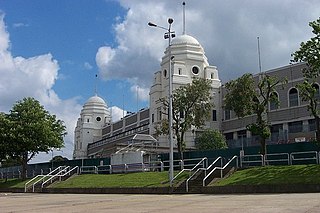
The Women's FA Challenge Cup Competition is the top annual cup tournament for women's clubs in English football. Founded in 1970, it has been named the WFA Cup, FA Women's Cup and now Women's FA Cup.

The FA Women's National League, formerly WFA National League and FA Women's Premier League (WPL), is a group of six football divisions which was run by the English Football Association until 2014 when it changed to become an FA branded league run by an independent elected management committee. Originally founded in 1991 by the Women's Football Association, the League included England's top division from 1991 to 2010.

Charlton Athletic Women's Football Club (CAWFC) is a team founded in 1991 as Bromley Borough which plays in the Women's Championship. Also known as Croydon Women's F.C. and Charlton Athletic (2000-07), it was one of the most successful women's teams in England.

Doncaster Rovers Belles Ladies Football Club, previously Doncaster Belles, is an English women's football club that currently plays in the FA Women's National League Division One Midlands, the fourth tier of women's football in England. The club's administration is based at the Eco Power Stadium in Doncaster, South Yorkshire, while home matches are played at nearby Thorne Colliery F.C.

Liverpool Football Club, commonly referred to as Liverpool or Liverpool Football Club Women if distinguishing themselves from the men's team, is a professional English women's football team based in Liverpool, Merseyside, England. They have served as the official women's division of Liverpool Football Club since 1994. Founded in 1989 as Newton LFC and subsequently renamed Knowsley United WFC, Liverpool Ladies and Liverpool FC Women over the years. The club was a founding member of the top-tier Women's Super League in 2011. A year later, Liverpool became the first English football club to offer every female player full-time professional contracts. This decision pioneered the professionalisation of women's football in England and led to Liverpool winning back to back Women's Super League titles in 2013 and 2014. They also won the FA Women's Championship for the fourth time, earning promotion back to the Women's Super League.

Clare Elizabeth Taylor is an English sportswoman, the first woman to have played on a World Cup team in both cricket and football. She represented England at both cricket, as a member of the winning World Cup cricket team in 1993, and football. Taylor attended Moor End Academy, her name was previously on the athletics record board but it has since been removed. Taylor was the first bowler for England to take 100 wickets in WODIs.

Deborah Bampton, MBE, is an English former international footballer who played as a midfielder. During her career Bampton won a treble at Arsenal and two doubles with Croydon. She also was capped a sum of 95 times for England, scoring seven goals all in all.
Lesley Higgs is an English former international women's football goalkeeper. She appeared for England in the 1995 FIFA Women's World Cup Finals.
The 1994–95 season of the FA Women's Premier League was the fourth season of national top-flight league women's football in England. It was the first season under FA Premier League branding after the WFA Women's National League was founded in 1991–92.
The 1993–94 season of the WFA National League Premier Division was the third season of national top-flight league women's football in England. The competition was organised by the Women's Football Alliance and the Football Association Committee for Women's Football.
Janice Murray is an English former international footballer. She played as a left winger for clubs including Leasowe Pacific, Doncaster Belles and Liverpool Ladies. Murray won around thirty caps for the senior England women's national football team.

The 1991–92 WFA National League Premier Division was the inaugural season of nationalised women's league football in England. The Women's Football Association (WFA) obtained a grant from the Sports Council in order to launch the league, described by Jean Williams as "a crucial step in adopting the structures of the male game."
The Greater London Women's Football League is an amateur competitive women's association football competition based in Greater London, England. The league is affiliated with the Amateur Football Alliance, Middlesex County Football Association, and London Football Association. Matches are played on Sundays.

The 1992–93 Women's National League Cup was a football competition in England organised by the Women's Football Association. It was the second edition of the competition, which was later run by the Football Association as the Women's Premier League Cup and is now known as the FA Women's National League Cup.

The 1977–78 Women's Football Association Cup was the eighth edition of the WFA Cup, the national women's football knockout competition in England. It was organised by the Women's Football Association (WFA) and was named The Pony WFA Cup for sponsorship reasons.

The 1988–89 Women's Football Association Cup was the nineteenth edition of the WFA Cup, the national women's football knockout competition in England. It was organised by the Women's Football Association (WFA).

The 1970–71 Women's Football Association Cup was the first edition of the WFA Cup, the national women's football knockout competition in England, which at the time was open to clubs from the rest of the United Kingdom. It was organised by the Women's Football Association (WFA).
The 1977 WFA Cup Final was the 7th final of the FA Women's Cup, England's primary cup competition for women's football teams. It was the seventh final to be held under the direct control of Women's Football Association (WFA). Southampton Women's F.C. and Queen's Park Rangers L.F.C. contested the match at Champion Hill, the home of Dulwich Hamlet on 15 May 1977. The match ended 1-0 to QPR and became the first London women's club to win the FA Women's Cup.
Michelle Slater is a former England women's international footballer.












